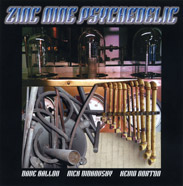Ballou/Norton/Didkovsky
Zinc Nine Psychedelic
(Punos Music)
It
took me a long time to place Zinc Nine Psychedelic inside the proper interpretative
framework, this being no fault of the album (which is not at all difficult
to listen to), by the way. The real cause for this being my (unconscious)
comparing the album to Swim This, the album released
about two years ago by the trio of Nick Didkovsky, Gerry Hemingway
and Michael Lytle which featured a layered, highly technological approach
to improvisation. Hence, my initial surprise when listening to music where "real
time" meant something very different.
My
second (unconscious) expectation dealt with improvisation as practised
here, which (though obviously being the by now familiar creation "in
the moment") was highly consonant and (relatively) easy to listen
to, something which I haven't encountered in a long time. So I was quite
surprised to find (what to me sounded like) echoes of Don Cherry, Milt
Jackson, raga-rock, and Robert Fripp. There's also what to me appears as
a
"poetic" use of materials, with none of the "ironic"
approach that's typical of the quotation practise so typical of
"post-modernism".
All
that's said above pertains to a critical perspective, something which listeners
usually ignore (in both meanings of the word).
I
had lost trace of Kevin Norton after his collaboration with Fred Frith's
group Keep The Dog. My fault, as a quick Web search showed me. I have to
confess this is the first time that I listen to "amplified, processed" trumpet
player Dave Ballou. I'm obviously quite familiar with Nick Didkovsky: Doctor
Nerve, Fred Frith Guitar Quartet, Bone, many solo works.
Recorded
live (quite well, with nice use of dynamics) on November 5, 2006, Zync
Nine Psychedelic presents about 1 hour from the three the group played
in the course of that concert. Norton's drums are "dry" (not "fat")
as rock drums, with fine-sounding cymbals; Ballou mostly plays in the trumpet's
"soft" register; his guitar sounding mostly dry, Didkovsky never
overplays.
Kaleidoscopic
opens with low volume, a trumpet phrase played with the use of
"repeat", small cymbal sounds, the guitar choosing pizzicato. The
track gradually develops into a Davis-like "vamp", with the drums
coming to the fore, the guitar growing in volume, and more than a pinch of
end-of-the-60s California psychedelia, something which sounds halfway between
The Grateful Dead and Fred Frith "in rock".
An
"infinite note" takes us to Diffraction, a fine drum solo with
an electronic-sounding background for guitar and effects.
Cortex
sounded to me as bearing obvious traces of Don Cherry as "desert nomad";
there's a measured guitar, and fine harmonics from the cymbals played arco.
Then the guitar becomes a harpsichord, with trumpet in the background.
After
a long pedal from trumpet and guitar, Seeing Stars has the ghost of Milt
Jackson playing a long vibes solo.
Electricity
sounds almost like raga-rock, with the return of the "desert nomad",
an "Indian"-sounding figure from the guitar, trumpet, cymbals
fading in, and a crescendo, "flamenco", guitar.
Focus
has big, exploding drums with tiny counterpoints from trumpet and guitar
appearing below, then it's an explosion that takes us to Zap, with its
howling crescendo.
Transformed
has the guitar playing a slow cadenza, cymbals fading in, then - starting
at about 3' - it's back to "Don Cherry".
Trumpet
sounds almost Davis-like on Woodcut, while the guitar plays harshly, and
the snare drum performs quite extreme excursions in volume.
Quite
funny this, the guitar on Sleep reminded me - in mood, if not in the actual
notes - of the guitar solo and the final part by Fripp on the King Crimson
track The Sailor's Tale. Excellent drums, crescendo, some trumpet hits,
cadenza, and out.
Beppe Colli
© Beppe Colli 2009
CloudsandClocks.net | Oct. 18, 2009











